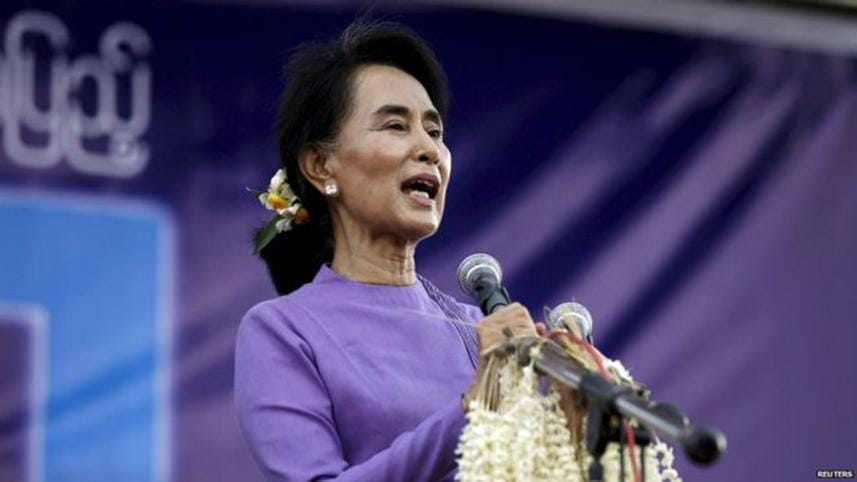Myanmar parliament rejects charter change in blow to Suu Kyi

Myanmar's parliament Thursday dealt a body blow to Aung San Suu Kyi's hopes of amending a junta-era constitution that bars her from the presidency before landmark elections, voting down a bill to end the military's effective veto on charter change.
The vote, held after three days of energetic debate between uniformed soldiers and elected MPs, saw parliament shoot down a draft amendment that would have loosened the military's political stranglehold.
Myanmar's parliament continues to be dominated by the army and former generals despite reforms that ended decades of outright junta rule in 2011.
Observers say the military, who trampled on dissent and laid waste to the economy during their rule, is staunchly opposed to any further reduction of its powers.
The 436 amendment bill was "not enacted", parliamentary speaker Shwe Mann told the legislature, after 388 lawmakers -- or around 60 percent -- voted in favour of the change, below the threshold of 75 percent needed for it to pass.
The amendment was seen as a key to changing further clauses.
The result virtually extinguishes Suu Kyi's chances of the presidency at this stage because of a provision excluding those with foreign children from the top office. Her sons are British.
Speaking directly after the result Suu Kyi urged Myanmar's people not to "lose hope" after the failure to amend any major parts of the constitution.
Striking a note of defiance, she vowed the opposition would not "back down" from elections slated for October or November.
"From now on, we will focus on the election," she told reporters.
The polls are set to be the first national elections to include Suu Kyi's National League for Democracy for a quarter of a century and the party is expected to hover up seats, if the vote is free and fair.
But with Suu Kyi barred from the top job and no obvious second candidate within the NLD, observers predict the party could end up supporting a presidential candidate outside its ranks.
MILITARY STONEWALLING
Observers say the army is wedded to its perceived role as the protector of Myanmar's 2008 constitution, which was drawn up under a former military regime that kept Suu Kyi under lock and key for some 15 years.
The provision blocking Suu Kyi's route to the presidency was not up for debate in the draft bills before parliament Thursday.
Instead discussions pivoted on proposals to change clause 436, which demands that 75 percent of parliamentarians must vote for major constitutional changes, ensuring that unelected soldiers have the final say.
Military MPs have lined up to argue against the proposal, which would have reduced the voting threshold to 70 percent.
Despite wide expectations that the bill would not pass, the legislature fell into silence as the results were announced, with several other proposed amendments also voted down.
Several senior MPs for the NLD, which garnered five million signatures in a petition on changing 436 last year, appeared visibly upset.
Brigadier General Tin San Naing told reporters earlier Thursday that the proposed change was "not suitable" because "our democracy is still in a nascent stage".
PRESIDENTIAL HOPES
Suu Kyi, a Nobel laureate, who entered parliament after 2012 by-elections, has increasingly warned that Myanmar's reforms have stalled.
Andrew McLeod, a Research Fellow in Law at the University of Oxford who advised the parliamentary committees that reviewed the constitution, said there is a slim chance the NLD could try to reignite its charter change fight immediately after the elections.
A president will be selected by a newly formed legislature, but in a quirk of the Myanmar system the current parliament's term only finishes on January 31.
This period could give the NLD the chance at another crack at the constitution, said McLeod, using an election win as a mandate to try to "elect the president it wants".
"The capacity is there to do that, though the military will still have a veto on any proposed changes," he said.
The NLD last competed in a nationwide vote in 1990, when it won by a landslide but was never allowed to take power.
 For all latest news, follow The Daily Star's Google News channel.
For all latest news, follow The Daily Star's Google News channel.
Comments